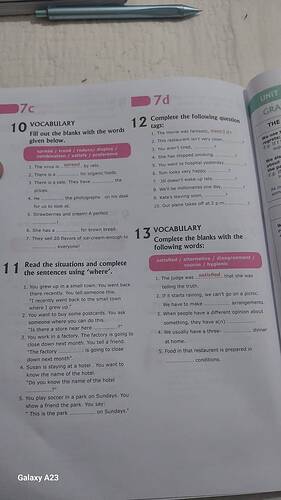Görüntüdeki alıştırmaların cevapları ve detaylı açıklamaları aşağıdadır:
10. VOCABULARY
Boşlukları aşağıdaki kelimelerle doldurun: spread / trend / reduce / display / combination / satisfy / preference
-
The virus is spread by rats.
- Spread: Yayılmak; bir şeyin geniş bir alana yayılması anlamında kullanılır.
-
There is a trend for organic foods.
- Trend: Eğilim; belirli bir yönde ilerlemek veya yaygın hale gelmek.
-
There is a sale. They have reduced the prices.
- Reduce: Azaltmak; fiyatları veya miktarları düşürmek.
-
He displayed the photographs on his desk for us to look at.
- Display: Sergilemek; bir şeyi görebileceği bir yerde göstermek.
-
Strawberries and cream! A perfect combination.
- Combination: Kombinasyon; iki veya daha fazla şeyin bir araya gelmesi.
-
She has a preference for brown bread.
- Preference: Tercih; bir şeyi diğerine yeğleme durumu.
-
They sell 20 flavors of ice cream—enough to satisfy everyone!
- Satisfy: Tatmin etmek; birinin istek veya beklentilerini karşılamak.
11. Sentence Completion Using ‘Where’
-
“I recently went back to the small town where I grew up.”
- Where: Bir yerin tarifinde kullanılır.
-
“Is there a store near here where I can buy some?”
- Where: Bir eylemin veya nesnenin yerini belirler.
-
“The factory where I work is going to close down next month.”
- Where: Bir yerin özelliğini belirtir.
-
“Do you know the name of the hotel where Susan is staying?”
- Where: Mekanla ilgili bilgi verir.
-
“This is the park where I play soccer on Sundays.”
- Where: Eylemin gerçekleştiği yeri bildirir.
12. Complete the Question Tags
-
The movie was fantastic, wasn’t it?
- Wasn’t it: Pozitif bir cümle için negatif ek kullanılır.
-
This restaurant isn’t very clean, is it?
- Is it: Negatif cümle için pozitif ek kullanılır.
-
You aren’t tired, are you?
- Are you: Negatif cümle için pozitif ek.
-
She has stopped smoking, hasn’t she?
- Hasn’t she: Pozitif cümle için negatif ek.
-
You went to hospital yesterday, didn’t you?
- Didn’t you: Pozitif geçmiş zaman cümlesi için negatif ek.
-
Tom looks very happy, doesn’t he?
- Doesn’t he: Pozitif geniş zaman cümlesi için negatif ek.
-
Jill doesn’t wake up late, does she?
- Does she: Negatif geniş zaman cümlesi için pozitif ek.
-
We’ll be millionaires one day, won’t we?
- Won’t we: Pozitif gelecek zaman cümlesi için negatif ek.
-
Kate’s leaving soon, isn’t she?
- Isn’t she: Pozitif geniş zaman veya şimdiki zaman cümlesi için negatif ek.
-
Our plane takes off at 2 p.m., doesn’t it?
- Doesn’t it: Pozitif geniş zaman cümlesi için negatif ek.
13. VOCABULARY
Boşlukları aşağıdaki kelimelerle doldurun: satisfied / alternative / disagreement / course / hygienic
-
The judge was satisfied that she was telling the truth.
- Satisfied: Tatmin olmuş; bir şeyin doğru veya adil olması.
-
If it starts raining, we can’t go on a picnic. We have to make alternative arrangements.
- Alternative: Alternatif; diğer seçenek veya yol.
-
When people have a different opinion about something, they have a(n) disagreement.
- Disagreement: Anlaşmazlık; farklı bakış açıları veya görüşler sonucu ortaya çıkan durum.
-
We usually have a three-course dinner at home.
- Course: Yemek kursu; başlangıç, ana yemek ve tatlı gibi ardışık yemekler.
-
Food in that restaurant is prepared in hygienic conditions.
- Hygienic: Hijyenik; sağlık ve temizlik kurallarına uygunluk.
Bu cevaplarla birlikte daha iyi anlaman için kelimelerin anlamlarını ve kullanım şekillerini detaylı açıkladım. Başarılar!
